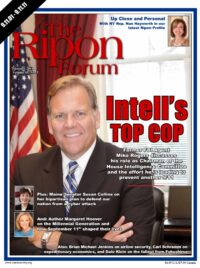
Ever since September 11, 2001, Americans have worried and wondered about the next terrorist attack. The questions of “when” – the Super Bowl or during an ordinary morning commute? – and “who” – a squad of trained terrorists or lone wolf? – are the cause of much speculation and theorizing.
As a leader of the Senate Homeland Security Committee, I am committed to taking action on every possible answer to those important questions. In addition, another question the Committee constantly probes is “what” – a dirty bomb, hunting rifle, or anything in between. By exploring this question from every conceivable angle, we strive to close the gap between threats and our preparedness.
Perhaps the biggest gap exists in what may well be the battlefield of the 21st Century – cyberspace. In fact, our military officials now describe cyberspace as the fifth domain of war, in addition to land, sea, air and space. But cyberspace is unique, they note, because it is the only battlefield invented by humans.
And the battle is arguably already underway. Recent attacks range from intrusions into Sony’s on-line gaming network to the largest U.S. military contractor. Hackers based in China reportedly gained access to hundreds of Gmail accounts, including some belonging to senior U.S. government officials and military personnel.
The annual cost of cybercrime worldwide has climbed to more than $1 trillion — billions of dollars annually in the United States. At his Senate confirmation hearing in June, Defense Secretary Leon Panetta warned that the “next Pearl Harbor we confront could very well be a cyberattack that cripples our power systems, our grid, our security systems, our financial systems, our governmental systems.”
Clearly, the Internet must be made more secure, but in a manner that promotes continued innovation and does not infringe on our constitutional rights to receive information and express views.
Clearly, the Internet must be made more secure, but in a manner that promotes continued innovation and does not infringe on our constitutional rights to receive information and express views.
President Mubarak’s actions in January to shut down the Internet in Egypt and the current cyber-censorship imposed by President Assad in Syria were, and are, attacks on fundamental human rights. Freedom of speech must be protected, and their bans are clearly designed to limit criticism of or action against oppressive governments.
Last year, Senators Joe Lieberman, Tom Carper, and I introduced legislation to strengthen the government’s efforts to safeguard U.S. cyber-networks from attack and prevent presidential overreach. That bill was unanimously approved by the Senate Homeland Security Committee.
In June, we introduced a new version with stronger, more explicit provisions that would prevent the President from ever shutting down the Internet.
Most important our bill would make America’s critical assets safer. Our bill would:
- Establish a cybersecurity leader within the Department of Homeland Security who would have the authority to coordinate policy and to mandate protective measures across all federal civilian agencies. This leader would head a new National Cybersecurity Center — much like the National Counterterrorism Center — that would bring together expertise from across the federal government.
- Promote information-sharing on cyber vulnerabilities and protective measures, distributing data to federal, state, local and tribal governments and private-sector stakeholders.
- Create incentives for the private sector to develop cybersecurity “best practices”.
- Provide specific authority to the National Cybersecurity Center —a risk-based, collaborative model — to identify and mitigate cyber vulnerabilities, where disruptions could result in catastrophic loss of life and property.
- Prevent the President or any official from shutting down the Internet.
This legislation would help our nation be better equipped to anticipate, neutralize and build additional safeguards against cyberattacks. It would protect the ever-evolving frontier of cyberspace, which encompasses so much of modern life and will only grow in importance.
We cannot afford to wait for a “cyber September 11th” before our government finally realizes the importance of protecting our digital resources, limiting our vulnerabilities, and mitigating the consequences of penetrations of our networks.
If we do not build adequate protections into our federal networks and critical infrastructure, malicious hackers — including nation-states and terrorist groups — are likely to exploit, attack and destroy them. America must be prepared to meet this emerging global cyber threat.
We cannot afford to wait for a “cyber September 11th” before our government finally realizes the importance of protecting our digital resources, limiting our vulnerabilities, and mitigating the consequences of penetrations of our networks.
We must be ready. It is crucial that we build a strong public-private partnership to protect cyberspace. It is a vital engine of our economy, our government, our country and our future. RF
___________________________________
Susan Collins represents the State of Maine in the U.S. Senate. She serves as Ranking Member of the Committee on Homeland Security and Governmental Affairs.




